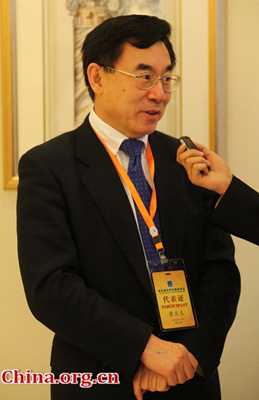Globalizing Chinese culture needs long-term plan
- By Mi Xingang
 0 Comment(s)
0 Comment(s) Print
Print E-mail China.org.cn, March 27, 2013
E-mail China.org.cn, March 27, 2013
The "Chinese culture going global" project has yet a long way to go and we cannot seek quick results, stated Huang Youyi, vice president of China International Publishing Group, during an interview with China.org.cn after presiding over a panel during the Fifth World Forum on China Studies at the Shanghai Exhibition Center on March 24.
|
|
|
Huang Youyi, vice president of China International Publishing Group, takes an interview with China.org.cn after presiding over a panel during the Fifth World Forum on China Studies at the Shanghai Exhibition Center on March 24, 2013. [Photo: Chen Weisong/China.org.cn] |
"Culture is the ideological and spiritual sediment that has been handed down through generations," Huang illustrated. "Therefore, unlike fast food, cultural transmission needs a long-term plan." Rushing to orchestrate Chinese concerts at the Vienna Golden Hall may yield very little short-term impact, but if we stuck to hosting these performances frequently over the next three decades, these concerts would definitely attract a larger foreign audience and enable them to learn more about the Chinese arts, according to Huang.
In retrospect, Chinese people becoming familiarized with European and Russian literature dates back to the turn of the 20th century; literary translation has been present in China a mere one hundred years, Huang said. Therefore, contemporary Chinese works, such as Mo Yan's books which date back 30 years, need a long process of distribution and we cannot seek quick results, he explained with another example.
Along with the pace of economic development in China, cultural and political influence too should be enhanced in order to strengthen comprehensive national power, Huang emphasized. Producing excellent works, especially elite ones that could attract world-wide attention and exert global influence, is the most pressing task that lies ahead, he said. At first, more incentive measures should be issued to produce voluminous art works in multiple forms, he added.
With regards to China's recent box-office hit "Lost in Thailand," the senior translator gladly told the reporter that he too had followed suit and watched the movie. "But partly for academic research purposes," Huang added in a winking way. "Its 1.3-billion-yuan (US$ 209.3 million) box office value does not surprise me at all," he said.
"The film caters to the taste of certain groups, especially young people, and it also reminds me of some similar western films 30 years ago." According to Huang, the fact that we can now make fun of touristic experiences abroad, a phase western culture has already experienced, proves the Chinese people's livelihood has currently reached a new all-time high.
"I hope you young people can enjoy yourselves and find your own favorite lifestyle in this multi-cultural society with a bulk of information," Huang told the reporter with a smile. "Forcing all of you to be tough grinders may be outdated and unreasonable."







Go to Forum >>0 Comment(s)